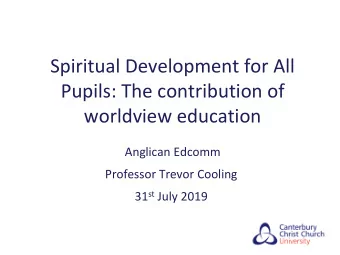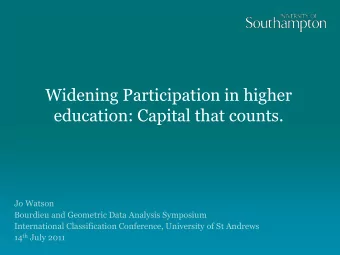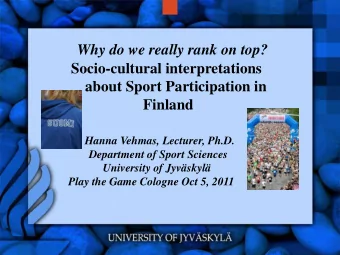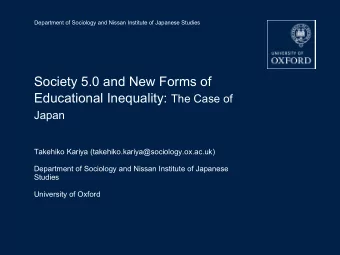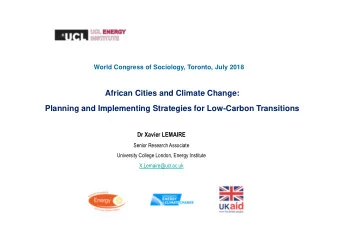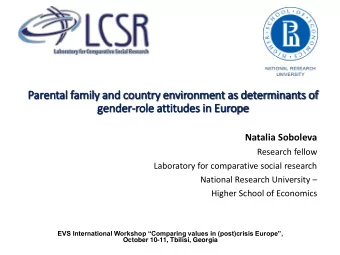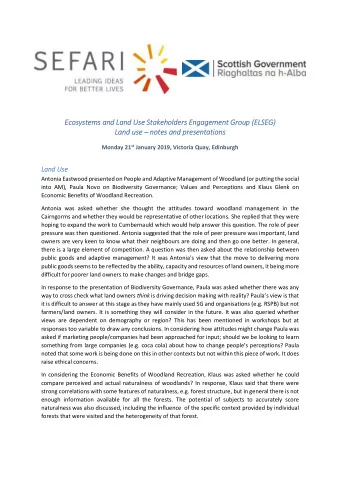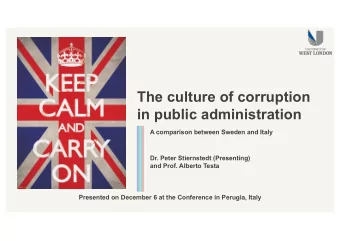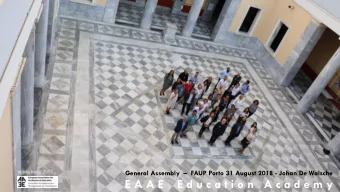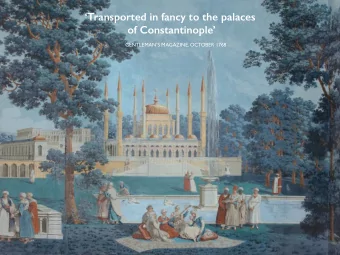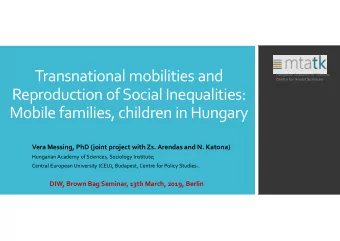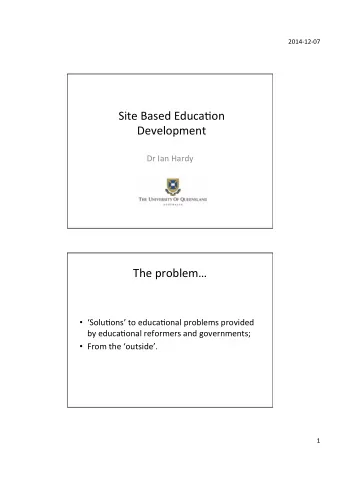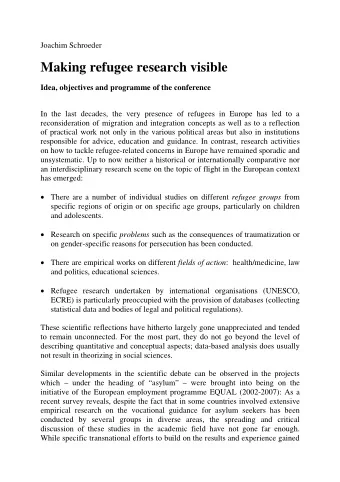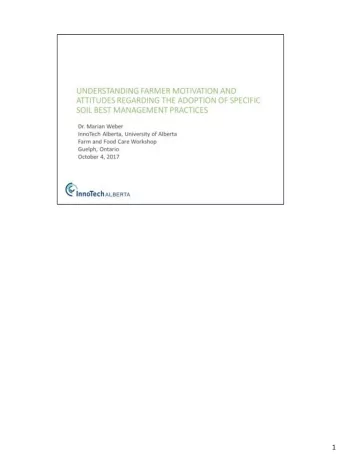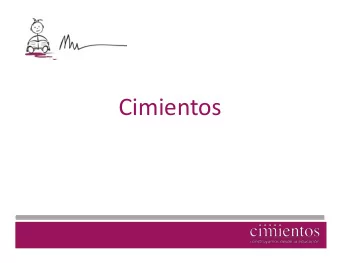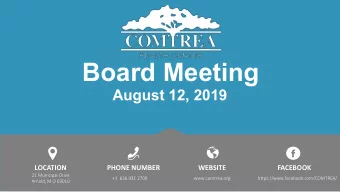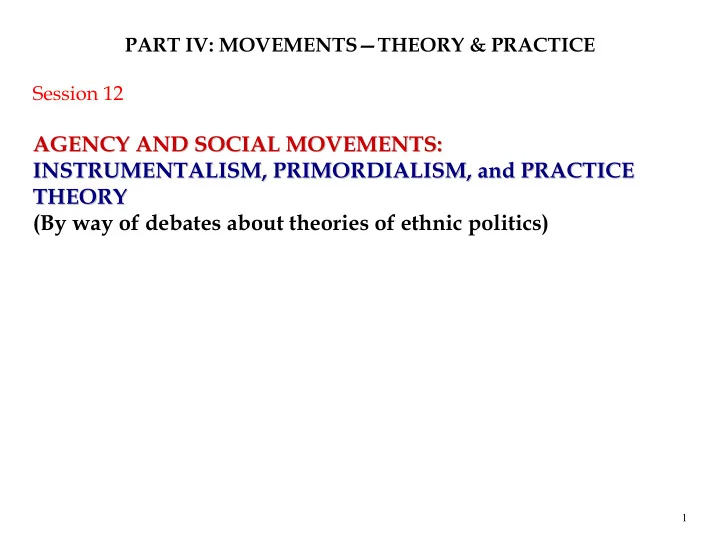
AG GE EN NC CY Y A AN ND D S SO OC CI IA AL L M MO - PowerPoint PPT Presentation
PART IV: MOVEMENTSTHEORY & PRACTICE Session 12 AG GE EN NC CY Y A AN ND D S SO OC CI IA AL L M MO OV VE EM ME EN NT TS S: : A IN NS ST TR RU UM ME EN NT TA AL LI IS SM M, , P PR RI IM MO OR
PART IV: MOVEMENTS—THEORY & PRACTICE Session 12 AG GE EN NC CY Y A AN ND D S SO OC CI IA AL L M MO OV VE EM ME EN NT TS S: : A IN NS ST TR RU UM ME EN NT TA AL LI IS SM M, , P PR RI IM MO OR RD DI IA AL LI IS SM M, , a an nd d P PR RA AC CT TI IC CE E I TH HE EO OR RY Y T (By way of debates about theories of ethnic politics) 1
What is Ethnicity? � common history and descent � common identity � culture traits , shares in common � fictive kinship , aura of shared blood ties , having obligations to each other � enduring solidarity , debts � the instrumentalist manipulation: fictive, aura, obligation, indebtedness —processualism � the primordialist attachment: common blood, descent, ancestors, family, belonging, roots, solidarity —essentialism Problem: � can both sides be correct? � where is the politics in this? 2
Abner Cohen: Ethnicity as Instrumentalist Politics � ethnicity operates within contemporary political contexts , not an archaic survival arrangement (Cohen 1969: 190) � manipulates values, norms, beliefs, symbols, and ceremonials � informal political organization � weapon in struggle for power with other groups � within the contemporary situation (Cohen 1969: ix; see also Cohen 1969: 5). � “ethnic groups are in an advantageous strategic position , for it is difficult and costly for any state to suppress the customs of a group in such respects as marriage and kinship, friendship, ceremonial, and ritual beliefs and practices. And it is these very customs that can readily serve as instruments for the development of an informal political organization. Within the new developing states, a grouping of this type is more stable and more effective in achieving its aims than a formal association in which loyalties derive only from contractual, interests” (Cohen 1969: 3). 3
� all ethnic groups = situational interest groups � “earning of livelihood , the struggle for a larger share of income from the economic system, including the struggle for housing, for higher education and for other benefits , and similar issues constitute an important variable significantly related to ethnicity” (Cohen 1974: xv) � “in the perennial request for livelihood in a divided labour market, competition for a greater share of income results in the formation of interest groups” � interest groups who robe themselves in cultural garb , to render themselves less vulnerable � a weapon to pursue collective advantage � Intentionality: calculations to seek advantage ; symbols become increasingly involved in social action ; infatuated with interests, ends, and means 4
Instrumentalism and the Divide between Leaders, Followers, and the State � Whose intentions are most manifest in the instrumentalization of ethnicity? � Who is responsible for the calculation of advantage? � Whose role is it to manipulate symbols? Who is manipulated by such symbolic practices? � Who decides what a group’s interests are, what means should be used to pursue those interests, and what are the appropriate ends? � Who possesses intentionality? The leaders of a “group” : � Ethnicity = “a conscious expression of short-term economic interest, ” a convenient fiction constructed by self-seeking leaders and sold to impressionable followers 5
� masking divergent interests , an instrument of class exploitation , point to ethnic elites � self-serving nature , elites erect an ideological screen of shared sentiment � secondary beneficiaries = state elites which co-opt ethnic leaders , preventing more dangerous class mobilization Problems: � This analysis rests on the powerful but unsubstantiated assumption that members of an ethnic elite possess an awareness of their class interests, a consciousness that is denied to their followers, and so elites can rouse the gullible masses to act in ways that are not in their own interests 6
The Primordialist Approach: Affectivity � people disoriented by change will seek refuge in those aspects of their shared lives that most fundamentally define for them who they are � deep-seated need for rootedness � gives rise to communal sentiments � long to belong to a wider family � organize around long-standing, often widely recognized customs and practices � respond to emotional needs even in the absence of overt political and economic threats � maintenance of ethnic identities even in situations of extreme discrimination and prejudice 7
Summary: Instrumentalism vs. Primordialism on Ethnicity � Instrumentalists view human action as rationally oriented toward practical goals while primordialists view action as value-oriented � instrumentalists stress circumstantial manipulation of identities while primordialists point to the emotional power of primordial symbols Practice Theory: Instrumentality Plus Affectivity � How do people come to recognize their commonalities in the first place? � Practice Theory: conjunction of affect and instrumentality � Bourdieu’s habitus = “the product of the work of inculcation and appropriation necessary in order for those products of collective history, the objective structures (e.g. language, economy, etc.) to succeed in reproducing themselves” (Bourdieu 1977: 72, 85) 8
� “The habitus comprises a set of generative schemes that produce practices and representations that are regular without reference to overt rules and that are goal directed without requiring conscious selection of goals or mastery of methods of achieving them” (Bourdieu 1977: 72) � seeking goals without being consciously manipulative and calculating � goals are essentially instilled in us through socialization � “ What is commonly interpreted as rational interest-seeking behaviour is in fact largely habitual , an acting out of habitual constraints encoded in unexamined assumptions about what is reasonable and unreasonable ” (Bourdieu 1977: 77) � “ Experience of objective constraints begins early in life, mediated by family relations attuned to them …the habitual dispositions thus engendered condition perception and appreciation of all subsequent experience” (Bourdieu 1997: 78) 9
� “Inculcation of the habitus depends on innate pattern- recognition capabilities…This process is similar to language learning, in which competence is achieved without conscious awareness of the structure of what is learned ” (Bourdieu 1977: 78) * demarcating fields of symbolic domination * mastery of the common code of euphemisms � the symbolism of ethnicity will carry the same sense of authenticity and moral compulsion for ethnic leaders as for their followers 10
References: Bourdieu, Pierre. 1977. Outline of a Theory of Practice. Cambridge UK: Cambridge University Press. Bourdieu, Pierre. 1994. “Structures, Habitus, Power: Basis for a Theory of Symbolic Power”. In Culture/Power/History . Nicholas B. Dirks, et al., eds. Pp. 155-199. Princeton NJ: Princeton University Press. Bentley, G. Carter. 1987. “Ethnicity and Practice”. Comparative Studies in Society and History 29(1):24-55. Cohen, Abner. 1969. Custom and Politics in Urban Africa. Berkeley: University of California Press. Cohen, Abner. 1974. “The Lesson of Ethnicity”. In Urban Ethnicity . Abner Cohen, ed. Pp. ix-xxiii. London: Tavistock. 11
Recommend
More recommend
Explore More Topics
Stay informed with curated content and fresh updates.

